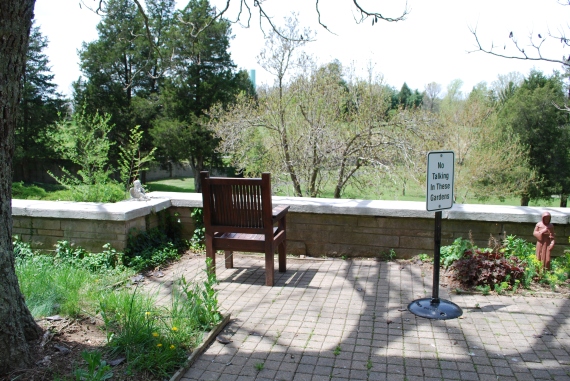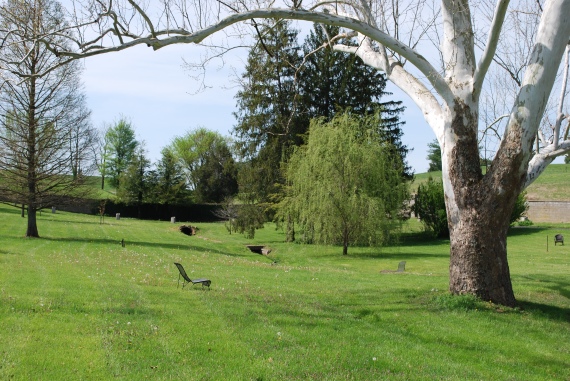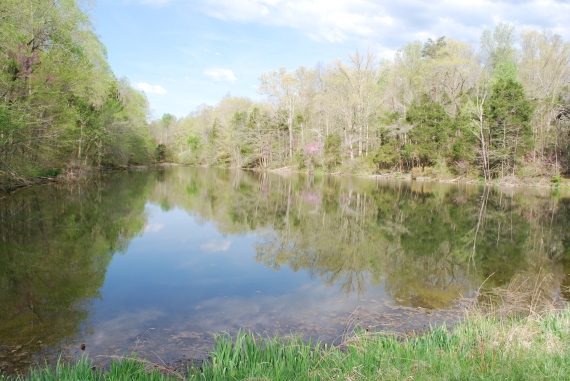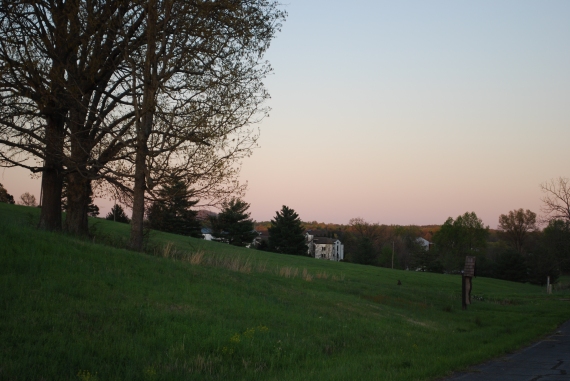Last summer I became intrigued by the idea of a silent monastic retreat at Abbey of Gethsemani in Kentucky. I visited the gift shop and experienced some of the quiet, and it became my fantasy, to spend time in still reflection and writing for a weekend. A friend was also interested, and last December we succeeded in getting a reservation for April of this year.
“But…what will you do there?” people asked me.
“I hope nothing,” I’d answer. “Hopefully write. And read. And just be.”
Most people thought I was holding back the details of some personal predicament. They narrowed their eyes at me and grinned with suspicion. I can only imagine what thoughts ran through their heads. Early mid-life crisis? Seeking forgiveness for secret crimes? Contemplating divorce? Scoping a quiet field to bury a body, where if someone saw me digging they wouldn’t be permitted to shout about it?
Nope. Just in need of calm.
And then, in the week preceding our reservation, life laughed at my fantasy and threw me lemons. Kids repeatedly staring at me with arrogant disappointment when their dinner was placed in front of them, writing rejections days before I planned to leave, a raccoon skirmish on our roof late one night that nearly involved infestation, one child vomiting on the table at Easter breakfast, ridiculous drama at the other child’s school with another parent, and on and on and on. So by the time I checked into the abbey, I felt very very small, and happy just to have arrived in one piece. Instead of just relaxing, I was now in need of mending.
It was challenging to rest once we arrived, but after attending a service and listening to the monks sing, I was entranced. I drifted off to sleep that night and awoke to the chirping of birds.
My friend and roommate whispered, “Did you sleep well?”
“Yes,” I said. She was silent and made no eye contact. “I mean, I think so? I was so exhausted from the drama and the long drive that I fell right asleep and I don’t remember waking until now.”
“Oh,” she said. “You don’t remember talking in your sleep?”
“Huh?”
“Yeah, you were crying and moaning in your sleep.”
“Um…did you throw a shoe at me or something? I don’t want to get us kicked out of a silent retreat by crying in my sleep!”
“No, you seemed really upset. I felt bad for you.”
Based on this, I decided I needed some time to myself to journal. At some point I sat outside in a simple comfortable wooden chair facing the garden. Amidst the peace, I wrote and I read. My brain made lemonade with life’s lemons. It continued to do so over the next couple of days. My friend and I had such an amazingly simple, calm refreshing time that we can’t wait to return.
Surprise highlights of the trip included:
1. While sitting in the garden relaxing, my brain went so zen that I forgot where I was and how things work. A spider wove a web around me and I just watched it, without thought. Since the monastery felt like heaven, I decided it was not physically possible for the sun to hurt me. I considered sunscreen for a second, and then decided it was a waste of time. So I got a sunburn. I was a sunburnt idiot in a state of zen, trapped in a spider’s web.
2. In addition to the sunburn, I was reminded that this wasn’t heaven when I realized there was no Wi-Fi. For awhile I decided one day I could become a cloistered nun if my husband should pass away and my kids were grown. But—no WiFi? Eh. Nope.
3. Do you think car alarms going off are annoying in “everyday life”? Sit overlooking a monastic garden watching a spider weave a web around you and then let your ears sense one. It must have been going off in the visitor parking lot a quarter mile away, but it seemed to play out within my own ear for over an hour, cycling through all its high-pitched phases. I wanted to claw my eardrums out.
4. Some monks are allowed to talk. And when they do, such as when giving optional lectures, everything they say is golden and fantastic. I am even more convinced that introversion is the path to either enlightenment or truly meaningful speech. It makes sense. If you only spoke a little each day, wouldn’t you make your words count more??
5. Just because people are within the presence of monks doesn’t mean they are inspired to behave ethically. Meals at the retreat were simple, but outside the cafeteria were placed samples of the fabulous fudge made onsite by the monks. Bourbon fudge, mint julep fudge, peanut butter fudge…oh my. Pieces were cut small and impaled with toothpicks. They were a nice treat for all of us to share. But over a meal in the “talking dining room” my friend overhead a middle-aged man say to his buddies, “Yeah, I took a plate of that fudge and covered it with plastic wrap and brought it back to my room.” Okay, chief. So….you (1) took more than your share and you (2) bragged shamelessly about it to your friends and within earshot of strangers (3) while still at the monastery. Wow, guy. Good for you.
6. There are 3 ways to take your meals at the monastery. The “hermit” dining room, which is always silent; the “talking” dining room; and the main dining room in which you are at the mercy of whoever controls the speakers— and you may hear silence, muffled church music or Thomas Merton readings (we never lucked out with the readings). After one silent meal in main room (we hadn’t found the other rooms yet) we vowed never to go back unless Merton readings were played. At our meal we sat across from each other and listened to the sounds of mouths chewing, forks clanking on plates, throats clearing, and liquids being swallowed. But the weirdest part was sitting across from someone you know and not talking. Where are my eyes supposed to go? I thought. If my friend and I looked at each other something made us want to laugh. If I looked at strangers I felt like I was staring or eavesdropping with my eyes. If I looked down I felt depressed. Conversation takes the awkwardness out of eye contact, and when that is lacking, the eyes become very nervous. In turn, when I felt others’ eyes on me I felt as though I were being stared at or judged. Additionally, my friend wasn’t nearly as hungry as I was, so she finished eating faster and got to just stare at me while I shoveled in forkfuls of food at a faster and faster pace. I ate like a pig at the trough and felt more eyes on me. It was an awful social experiment that I don’t think I’ll ever try again. Conversation and eating go hand in hand. If the monks always eat in silence, and they can’t even stare at the email on their phones without Wi-Fi, then I would guess that thrice daily they question their vocational choice.
7. We watched a video about monastic life. Did you know that the monks get a little time each day to pursue their own individual hobbies? They pray/sing 7 times per day plus attend Mass, and they engage in manual labor, yet they have time to themselves for things like photography and writing and ceramics. I do not have daily time to myself, particularly over a period of time like now, summer, when my kids are home from school. I’m not saying I’m jealous necessarily (see #6), but I take this fact as evidence that God sanctions happiness and leisure to some extent. This fact shall be used in future arguments and parental guilt trips on my part.
8. Amazing things can happen when you allow your brain to shut up and there is quiet around you. You realize how much bird conversation exists in the trees. Things you have been struggling with begin to make sense a bit, but faster than they would have if you were home surrounded by distraction. You become grateful for every breath you take. Time slows. The universe is at peace. Until a car alarm sounds. Then back to peace.
9. There is a smoking porch overlooking the garden too. Because Kentucky? I dunno.
10. The only troubling thought I had while on retreat was “How in the world do these monks get anything done?! They pray at 3:15 am and then it’s back to the chapel 6 more times plus Mass, ending after 7pm.” I wonder if any ever play hooky? I’d probably play some hooky. I’d be like, “I prayed about that problem 5 times already today. I really think Jesus has my back on this one. I’ll just hum the next chants to myself while I go sketch some scenery. Besides, I’m feeling a bit under the weather [cough].”
That’s right—the monks begin chanting at 3:15 am, with Vigils. To find peace in your life when you can’t be on monastic retreat, consider for just one minute that no matter what horrific chaos goes on in the world, there are groups of people who rise well before dawn and sing and pray for over an hour, for peace in the world. Expecting nothing in return. And because we got up with them one morning, to experience it, I can tell you that they look tired. They rub their eyes and clear their throats. They move slowly. Yet they get up. While the rest of us cry and talk in our sleep. That’s some pretty amazing stuff.






Lots of food for thought (without making eye contact of course). Not having to talk must free up so much mental energy. So often we feel obliged to fill the air with conversation to avoid awkward silences. Thanks for the account.
Good point. Something amazing has to happen in these monks’ heads, right? It’s just so interesting to me.
It sounds like a wonderful experience.
It was! We met a man who has been going on retreat there every 6 months for 20-30 years and he was the most peaceful soul I’ve ever been around. I definitely want to return.
Fascinating.
Yup. I kept picturing some of my extroverted friends there though and imagining how miserable it would be for them!